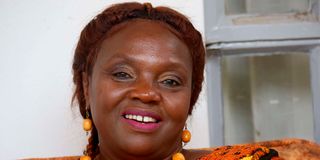Dorcas Gachagua to initiate boy child empowerment programs

Dorcas Wanjiku Gachagua, Kenya's Second Lady during an interview at her home in Nairobi on July 7, 2022. She has announced plans to introduce nationwide empowerment programs for the boy child.
What you need to know:
- Second Lady Dorcas Gachagua has announced plans to introduce nationwide empowerment programs for the boy child.
- The initiative will also support young men to actualize their talents in sports and other creative fields like arts, through training and linking them to opportunities.
- Ms Gachagua to work with parents and the church in the boy child empowerment journey.
Second Lady Dorcas Gachagua has announced plans to introduce nationwide empowerment programs for the boy child.
She says the programs will entail rehabilitating young men lost in alcoholism and drug abuse into responsible men.
They will also comprise supporting those without professional training to undertake Technical and Vocational Education and Training (TVET) courses, to enable them have access to employment opportunities or become self-employed.
While speaking in Nyandarua, Ms Gachagua said the initiative will in addition support young men to actualize their talents in sports and other creative fields like arts, through training and linking them to opportunities.
“We cannot afford to lose a generation of our young men. We have to take them to rehabilitation centres where they can get the assistance they so badly need,” she emphasised.
The Second Lady revealed that she would work with parents and the church in the boy child empowerment journey.
Bottom up
“The program will see the launch of sports tournaments in all the 47 counties. We want to make sports a commercial venture where the youth can engage in and get paid well,” she said.
Ms Gachagua spoke at Kiambogo village, Kipipiri in Nyandarua County during the burial of Paul Njoroge, son of the Kiambu Chairperson of Association of Pentecostal and Evangelical Clergy Kenya.
Last week, Ms Gachagua revealed that the financial empowerment programs targeting boys and young men would be done in partnership with the Kenya Union of Savings and Credit Cooperatives.
"As a government, we are sure that we are going to partner with Saccos and change the economy from the bottom up. The bottom-up movement started from the cooperative movement, and these Saccos are the answers to the future of Kenya; our youth, women, and vulnerable," she said.
Last year, the immediate former Public Service and Gender Cabinet Secretary Prof Margaret Kobia raised the red flag over the neglect of the boy child in the country.
Prof Kobia called for inclusivity in the empowerment of both boys and girls.
The former CS said the society has given the girl child a lot of focus forgetting the boys, a thing she said needs to be rectified.
She revealed the government is particularly concerned with the turn of events in schools where many boys did not report back after the government opened the learning intuitions following the March 2020 closure prompted by Covid-19.
Back to school
She said her Ministry is in the process of putting in place specific interventions and programs both at the grassroots and urban centres to find out how and why many boys are not in school and ensure they are back to school.
“The government is very much concerned and keen to ensure that the boy child is also in school and remains there. My ministry is keen to ensure there is gender equality for both boys and girls in the country,” said Prof Kobia.
Agnes Salome Awuor the founder of Hekima Kaka Society, which addresses the plight of the boy child and men in Kenya echoes these sentiments.
“We need to be mentors and be our brothers’ keeper. All they need is empowerment so that they can become self-reliant. It is sad to note that boys have largely been excluded in the gender equality agenda. All genders are equal and must remain so,” Ms Awuor told Nation.Africa in a recent interview.
She noted that boys and men have largely been lost in alcoholism, drugs, self-pity, lack of direction, terrorist and criminal groups, unemployment, suicide, illiteracy and hopelessness.
She attributed lack of mentors as among the reasons the boy child continues to lose focus. Today, Kenya’s youth unemployment rate stands at 65 per cent, among the highest in the world.





